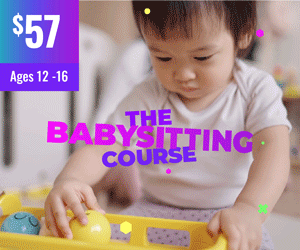
This Barrie 360 content is brought to you by The Babysitting Course
As a parent, you want to help your child succeed in life. This means teaching them the life skills that will empower them to become healthy and productive adults. These lessons will also help your child build independence, confidence and self-esteem.
The list of things you can teach your child may seem like it’s never ending. But, there are crucial life skills that every kid should know before they turn 16. Here are 7 important ones …
1. How To Manage Money
T Rowe Price does a survey each year on kids and money. In 2020, the survey discovered that 12% of parents never talk to their kids about money and 41% are reluctant to discuss financial matters. Of the parents talking about money, 60% agree the conversations make a difference.
Now, money isn’t the most important thing. But knowing how to manage it can go a long way in helping your child lead a happy and secure life. It also increases confidence when it comes to financial decisions and conversations about money. This can help them achieve their goals, make smarter choices and maintain healthier relationships.
The first step in helping your child learn how to manage money is to talk to them about it. That doesn’t mean you have to give them detailed information about your salary and loans. But you can explain how money works. Some important discussions you can consider having are:
- The purpose of bills and why they need to be paid on time
- How you work to earn money so that you can buy necessities, like food, and fun items, like toys and trips
- Why you choose to use a credit or debit card and how each works
- Financial decisions you are proud of
- Things you wish you’d done differently when it comes to money
- Let your kids know when money is tight and explain how you have to prioritize needs over wants
Earning, Savings and Loans
Another great way to help teach children about money is by creating opportunities to earn money. This will teach them that money comes with hard work.
Start by giving them an allowance for doing chores around the house. As they become more responsible, encourage them to start working for others. Some options include mowing lawns, delivering newspapers or babysitting.
RELATED: You won't believe how much money babysitters can make today ...
This will help teach your kids to live within a budget; only spending what they are able to earn. Once your kids understand the work involved in making money, you can move to new topics such as saving and borrowing.
To do this, encourage your child to work their way to a bigger purchase by saving. This will teach them about delayed gratification, the power of saving, and how to plan.
Start small with a toy they really want, then build to something bigger. You can also try to incentivize saving by matching the amount they save.
When you feel your child is ready to learn about credit, let them borrow a small amount of money to make a purchase. Negotiate how much and how often they need to repay you then stick to the schedule. This is a low risk way to help them understand loans and credits.
As they progress through lessons about money, you can work on more complicated topics. This can include how to make spending decisions, planning for the distant future, managing a bank account, using a credit card, etc.
2. How To Cook
With so many prepared and deliverable foods available to us, we sometimes forget how important basic cooking skills are. But teaching your child about food, healthy eating and cooking are important life skills. It will help your child develop planning skills, learn about food safety and explore their creativity.
When teaching your child about cooking and food, consider these topics:
- Planning: Show your child how to find a recipe, how to read it and how to make a list of the food and tools they need.
- How to get food: Talk to your child about growing and buying food, how to read labels and how to stay within a budget.
- Safety: Teach your child how to work in the kitchen safely. This includes how to use potentially dangerous tools like the stove and knives. It also includes talking about safe food handling, storage and cleanup.
- Cooking: Show your child how to measure ingredients, how often to stir/rotate and how to ensure everything is properly cooked.
When your child first starts cooking, let them assist you. As they gain experience, you can adjust the level of supervision and direction. Move from preparing a simple snack to making sandwiches to cooking something on the stove.
For older kids with more experience, consider getting them to plan and prepare one meal a week or month.
3. How To Do Basic First Aid
Staying safe is a major consideration in all that we do. That’s why you want to be sure your child understands the basics of safety. This can help prevent accidents and reduce the risk of an emergency situation.
In addition to safety, your child should also know basic first aid. This will help your child feel more confident and prepared. In an emergency situation, basic first aid can help save lives.
At home, you can start teaching your child about:
- Awareness and prevention of accidents - show them how to assess their environment for potential dangers. When they are doing something that could potentially hurt them or someone else, don’t just tell them to stop. Take the time to explain why they shouldn’t do it.
- What an emergency is - teach them what qualifies as an emergency, when to call 911, and the importance of remaining calm during the call so that they can provide responders with the information they need.
- First Aid Kits - show your child where the first aid kit and supplies are. Teach them what each item is and how to use them.
- Treating common injuries - Teach your child how to treat common injuries like scrapes, light burns, nose bleeds and stings.
These lessons can be adjusted for your child's age and maturity. For young children, role play and act out emergency situations, such as fire drills, accidental scrapes, etc. This can be a great way to teach your child what to do in an emergency while making the lesson fun.
As your child gets older, you may want to consider a first aid course. It not only helps improve your child’s skills and potentially saves lives. It’s also a great addition to their resume when it comes time for them to find a job.
4. How To Be Safe Online
In today’s digital world, online literacy is a core life skill for anybody. This is especially true for children who are new to the pressures of social media and the internet.
Social media and the internet are not inherently bad. But there are online threats they may encounter from cyberbullying to predators. That’s why it’s important to teach your children how to stay safe online.
Before you can help your child be safe online, make sure you learn about the apps and platforms they use. Being familiar will help you understand the risks. You’ll also be better equipped to talk with your child about them.
Like everything you teach your child, it’s also important to have an open dialogue. Talk to your child about the threats that exist and how to avoid them. This may include scammers, how everything on the internet is forever, predators and more. The topics you discuss and detail you provide will depend on your child and the level of autonomy they have on the internet.
You also want to let them know they can come to you about topics that are new or unfamiliar to them without judgment. This open communication will increase the likelihood of your child letting you know when they aren’t sure about a situation.
Another important step is laying out the ground rules and explaining the reason for them. The rules you have will change as your child gets older but examples include:
- Don't share personal information online
- Only accept friend requests and chat with people you know in the real world
- Don’t let other people use your phone, tablet or laptop
- Don’t open emails from unknown senders
- Don’t share photos of yourself online and through text
- Don’t click links or download anything without talking to an adult first
- If you accidentally click something you shouldn't have, let an adult know immediately
5. How To Manage Time
As an adult, time management takes a lot of extra work and planning. For a kid, managing homework, activities, friends and family can be just as overwhelming.
To help your child learn time management, encourage them to get it on paper. As adults we use calendars and apps. Depending on the age of your child, a wall calendar in a communal space, a personal planner or their own apps can help keep them on track.
You can also encourage them to develop a routine. Explain how doing homework and chores before hanging out with friends can reduce stress and can make the activity more fun. Get them to block out time to complete certain tasks like chores, homework, practice, etc.
You can also teach them how to prioritize conflicting engagements such as a birthday party and a family obligation.
With older kids, give them freedom to manage their own schedules and only intervene when necessary
6. How To Find A Job
Job hunting is very involved and sometimes complicated. Especially for a young person with little experience, a thin resume and no idea what types of jobs they like.
Like everything we have covered so far, communication is key. Talk with your child about what is involved in the job hunting process and how to safely look for work.
Do mock interviews with them and help teach them how to talk positively about themselves. You can also show them how to transition skills from one area of their life to a job. For example if your child is an athlete, they can talk about their strong teamwork and time management skills.
While most companies can’t hire kids under 14, there are opportunities for children to work on their job finding skills early on. This includes:
- Working for parents (i.e. chores)
- Offering skills to neighbours like mowing the grass and shoveling snow
- Distributing newspapers
- Tutoring
- Becoming a babysitter
All these will give your child an opportunity to talk with potential “employers”. They can also practice negotiation and talking themselves up. As an added bonus, it will also help bulk out their resumes.
Another way you can help them improve their resume is through after school courses. This can include cooking classes, as well as first aid or babysitting training.
7. How To Take Care Of Themselves And Others
Compared to other life skills we have discussed so far, this one is a bit broader. The goal is to make sure your child can safely care for themselves and others when left alone. This includes understanding people’s needs at different ages and stages of life and making sure they’re filled.
The specific life skills your child needs will depend on the situation you expect them to face. Even some of the life skills we have talked about will help make sure your child is equipped to look after themselves and others.
- Cooking and food knowledge will make sure they stay fed and hydrated with healthy options
- First aid will help them handle accidents and emergencies
- Time management will ensure they can stick to a schedule
You also want to teach your child how to be independent. The best way to do this is to give them opportunities to be independent, gradually increasing the challenge with each situation.
Another major skill they should learn is problem solving. Problem solving can be used in every area of our lives. It helps us evaluate information to guide our beliefs, decisions and actions. Teaching your child problem solving and critical thinking early on will set them up for success as they start:
- Caring for themselves and others
- Applying for jobs
- Spending time alone with friends
- And more
Start easy - introduce your child to options. This gives them an opportunity to make decisions for themselves while allowing you to manage the situational risk. As they get older and more mature, ask open ended questions to leave room for thoughtful thinking and creativity.
At the end of the day, the goal is to equip your child with the life skills they need to do well. While this list of critical skills is a great place to start, the lessons you teach your child will depend on the challenges you believe they will face.














